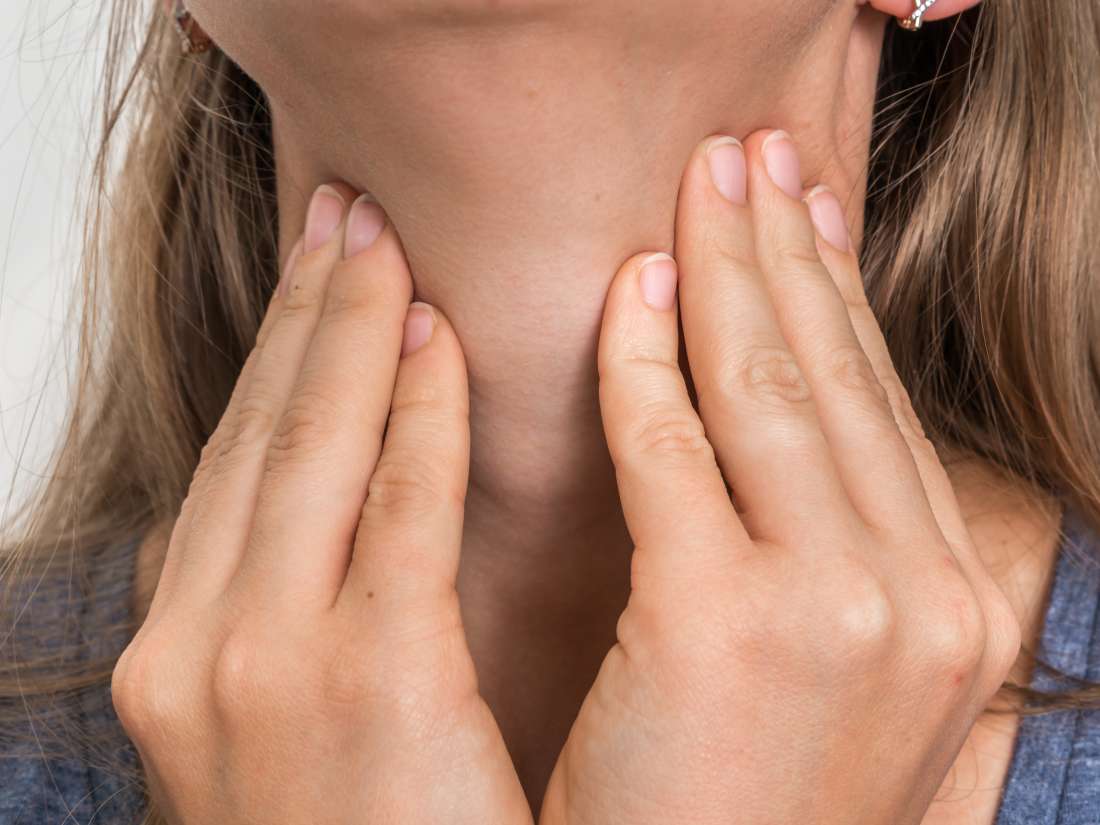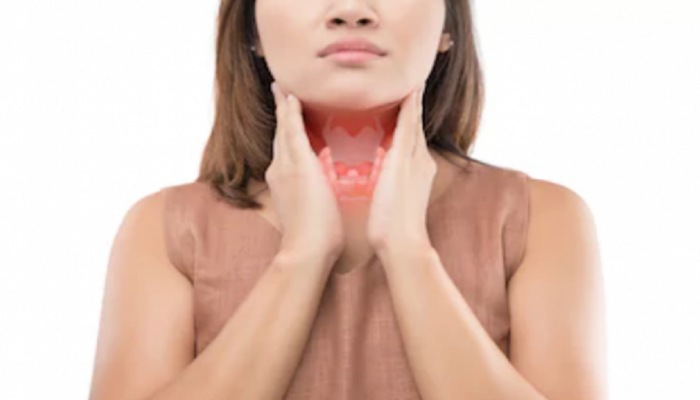The thyroid regulates your metabolism.
The two main thyroid hormones are T3 and T4.
Thyroid disorders are common, and they include goiters, hyperthyroidism, and hypothyroidism.
The thyroid’s main role in the endocrine system is to regulate your metabolism, which is your body’s ability to break down food and convert it to energy. Food essentially fuels the body, and each of our bodies uses that fuel at different rates. This is why you often hear about some people having a “fast” metabolism and others having a “slow” metabolism.
The thyroid keeps your metabolism under control through the action of thyroid hormone, which it makes by extracting iodine from the blood and incorporating it into thyroid hormones. Thyroid cells are unique in that they are highly specialized to absorb and use iodine. Every other cell depends on the thyroid to manage its metabolism.
The pituitary gland and hypothalamus both control the thyroid. When thyroid hormone levels drop too low, the hypothalamus secretes TSH Releasing Hormone (TRH), which alerts the pituitary to produce thyroid stimulating hormone (TSH). The thyroid responds to this chain of events by producing more hormones. To learn more, read our article about how the thyroid works.
Anatomy of the Thyroid
Derived from the Greek word meaning shield, the thyroid is a butterfly-shaped gland located in front of the windpipe (called the trachea) and just below the larynx or Adam’s apple in the neck. It is comprised of two halves, known as lobes, which are attached by a band of thyroid tissue called the isthmus.
During development, the thyroid is actually located in the back of the tongue and has to migrate to the front of the neck before birth. There are rare instances when the thyroid migrates too far or too little. There are even cases when the thyroid remains in the back of the tongue—this is known as lingual thyroid.
Hormones of the Thyroid
The two main hormones the thyroid produces and releases are T3 (tri-iodothyronine) and T4 (thyroxine). A thyroid that is functioning normally produces approximately 80% T4 and about 20% T3, though T3 is the stronger of the pair.
To a lesser extent, the thyroid also produces calcitonin, which helps control blood calcium levels.
Diseases and Disorders of the Thyroid
There are many diseases and disorders associated with the thyroid. They can develop at any age and can result from a variety of causes—injury, disease, or dietary deficiency, for instance. But in most cases, they can be traced to the following problems:
Too much or too little thyroid hormone (hyperthyroidism and hypothyroidism, respectively).
Abnormal thyroid growth
Nodules or lumps within the thyroid
Thyroid cancer
Some of the Most Common Thyroid Disorders.
Goiters: A goiter is a bulge in the neck. A toxic goiter is associated with hyperthyroidism, and a non-toxic goiter, also known as a simple or endemic goiter, is caused by iodine deficiency.
Hyperthyroidism: Hyperthyroidism is caused by too much thyroid hormone. People with hyperthyroidism are often sensitive to heat, hyperactive, and eat excessively. Goiter is sometimes a side effect of hyperthyroidism. This is due to an over-stimulated thyroid and inflamed tissues, respectively.
Hypothyroidism: Hypothyroidism is a common condition characterized by too little thyroid hormone. In infants, the condition is known as cretinism. Cretinism has very serious side effects, including abnormal bone formation and mental retardation. If you have hypothyroidism as an adult, you may experience sensitivity to cold, little appetite, and overall sluggishness. Hypothyroidism often goes unnoticed, sometimes for years, before being diagnosed.
Solitary thyroid nodules: Solitary nodules, or lumps, in the thyroid are actually quite common—in fact, it’s estimated that more than half the population will have a nodule in their thyroid. The great majority of nodules are benign. Usually, a fine needle aspiration biopsy (FNA) will determine if the nodule is cancerous.
Thyroid cancer: Thyroid cancer is fairly common, though long-term survival rates are excellent. Occasionally, symptoms such as hoarseness, neck pain, and enlarged lymph nodes occur in people with thyroid cancer. Thyroid cancer can affect anyone at any age, though women and people over thirty are most likely to develop the condition.
Thyroiditis: Thyroiditis is an inflammation of the thyroid that may be associated with abnormal thyroid function (particularly hyperthyroidism). Inflammation can cause the thyroid’s cells to die, making the thyroid unable to produce enough hormones to maintain the body's normal metabolism. There are five types of thyroiditis, and the treatment is specific to each
A certain amount of hair loss is normal. This is because each hair follicle goes through an individual cycle of birth, growth, and death. On an average, our hair is replaced every three and a half years. Since each hair follicle has a different rate of growth, all your hair does not grow or fall off at the same time. According to many physicians, losing up to 100 strands of hair a day is normal. However, this can be accelerated by hormone imbalances caused by thyroid problems. Hypothyroidism or hyperthyroidism can affect the production of a hormone known as dihydrotestosterone or DHT. This makes hair follicles shrink and makes it easier for them to fall out. It also slows regrowth.
Ayurveda likens this hormonal imbalance to an imbalance of doshas. It suggests a number of remedies that can help balance these doshas and stop or reduce hair fall. Ayurvedic remedies are based on herbs and natural ingredients that you may have at home. They are also relatively safe and have negligible side effects. Some popular Ayurvedic remedies for hair loss include:
Scalp Massages: Massaging the scalp with hot oil can help improve blood circulation and improve hair growth. It can also strengthen the hair roots and prevent them from falling off easily. Some of the best oils for a scalp massage to combat hair loss are coconut oil, bhringraj oil, and brahmi oil. Adding crushed garlic and onion to the oil is also known to reduce hair fall. You may oil your hair before an hour or two before a shower or leave the oil overnight.
Eat the right foods: While we think of the hair as dead cells, the hair roots are very much alive and need nutrition. Reduce the amount of salt being consumed and stay away from store bought masalas. Consuming fresh amla or amla juice can help strengthen the hair. You could also boil a cup of milk with three cups of water and 2-3 cardamom pieces till all the water has evaporated and only the milk remains. Drink their milk on an empty stomach for 2-3 menstrual cycles. Thyroid patients experiencing hair loss can also benefit from Ayurvedic preparations such as Ashwagandharishta and Bhringarajasava. However, these should be consumed only under the supervision of an ayurvedic doctor.
Yoga: Certain yoga asanas can also help improve blood circulation and strengthen the liver and uterus. They also help relieve stress that can be a contributing factor towards hair loss. These include the Vajrasana, Pawanmuktasana and the Shirisasana. When practicing these asanas it is important to follow the yogic guidelines and practice only those asanas that suit your body.
वजन कमी करणे, डायबिटीसपासून ते पचनक्रियेसंबंधी समस्या दूर करण्यासाठी धने फायदेशीर आहेत. धन्याच्या बीयांचं पाणी इतकं फायदेशीर असतं की, हार्मोन्सच्या समस्याही सहजपणे दूर केल्या जाऊ शकता. थायरॉइडसारखी समस्या धन्याचे पाणी रोज सेवन केल्याने काही दिवसात दूर होते असे मानले जाते. डायबिटीससोबतच धन्यांमध्ये असेही तत्व आढळतात ज्याने कॉलेस्ट्रॉल सुद्धा कमी केलं जाऊ शकतं. धन्याच्या पाण्याने जळजळ दूर होते आणि पिंपल्सची समस्याही दूर होते.
थायरॉइडच्या ग्रंथी या फुलपाखरांच्या आकाराच्या असतात, ज्या घशामध्ये असतात. या ग्रंथी मेटाबॉलिज्मला नियंत्रित करतात. म्हणजे जे अन्न आपण सेवन करतो ते ह्या ऊर्जेत बदलण्याचं काम करतात. त्यासोबतच हृदय, मांसपेशी, हाडे आणि कोलेस्ट्रॉलला सुद्धा प्रभावित करतात. थायरॉइड हार्मोन्स शरीरातील ऊर्जेचा स्तर, हार्ट रेट, ब्लड प्रेशर, मूड आणि मेटाबॉलिज्मला रेग्यूलेट करतात. पण या हार्मोन्सचं प्रमाण वाढल्याने किंवा कमी झाल्याने अनेकप्रकारच्या आरोग्यासंबंधी समस्या होऊ शकतात.
आपल्या शरीरात थायरॉइड हार्मोनचा समतोल राहणं गरजेचं असतं हे आत्तापर्यंतच्या लेखांमधून स्पष्ट झालंच. थायरॉइड हार्मोनच्या कमतरतेमुळे होणाऱ्या आजाराला हायपोथायरॉइडीझम असे म्हणतात, या उलट थायरॉइड हार्मोनचे प्रमाण अधिक झाले तर त्यातून उद्भवणाऱ्या आजाराला थायरोटॉक्सिकोसिस-हायपरथायरॉइडीझम असे म्हणतात.
थायरोटॉक्सिकोसिस व हायपरथायरॉइडीझम या दोहोंमध्ये फरक करणं गरजेचं आहे. या दोन्ही आजारांची लक्षणे साधारणत: सारखी असली तरीही लागणारे उपाय मात्र वेगवेगळे असतात. थायरो-टॉक्सिको-सिसमध्ये रक्तांमधील थायरॉइड हार्मोन प्रचंड प्रमाणात वाढतं. हे अतिरिक्त वाढलेलं प्रमाणच या आजारातील लक्षणांना जबाबदार असतं. थायरोटॉक्सिकोसिस अनेक कारणांमुळे होऊ शकतो. पण ज्यावेळेस थायरॉइड ग्रंथी अधिक सक्रिय होऊन हा आजार होतो त्याला हायपरथायरॉइडीझम असे म्हणतात.
असं तयार करा धन्याचे पाणी
२ चमचे धने किंवा धन्याच्या बीया रात्री एक ग्लास पाण्यात भिजवून ठेवा. सकाळी हे धने पाण्यासहीत ५ मिनिटांसाठी उकडा आणि नंतर हे पाणी कोमट झाल्यावर सेवन करा. जर तुम्ही थायरॉइड कंट्रोल करण्यासाठी औषधं घेत असाल तर आधी रिकाम्यापोटी औषध घ्या आणि नंतर ३० मिनिटांनी हे पाणी प्यावे. त्यानंतर ३० ते ४५ मिनिटांना तुम्ही नाश्ता करू शकता. तुम्ही हे पाणी दिवसातून दोनदा रिकाम्या पोटी सेवन करू शकता. हे पाणी थायरॉइड कंट्रोल करण्यात फायदेशीर ठरतं. ३० ते ४५ दिवस या पाण्याचे सेवन केल्यावर तुम्ही तुमच्या थायरॉइडची लेव्हल चेक करा.
थायरॉइड कंट्रोल करण्यासाठी आहारही महत्त्वाचा
१) कॅल्शिअम, व्हिटॅमिन आणि प्रोटीन असलेला आहार थायरॉइड ग्रस्त लोकांसाठी महत्त्वाचा आहे.
२) दूध आणि दह्याचं अधिक सेवन करावं.
३) व्हिटॅमिन डी हायपोथायराइडिज्म आणि याचसारख्या आजारांपासून बचाव करतो.
४) सकाळी लवकर उठून सूर्याच्या किरणांमधून व्हिटॅमिन डी घेण्याचा प्रयत्न करा.
५) व्हिटॅमिन ए सुद्धा फायदेशीर ठरतो. त्यासाठी तुम्ही गाजर, अंडी आणि हिरव्या भाज्यांचं सेवन करा.
६) थायरॉइडची समस्या असल्यावर जास्तीत जास्त फळं आणि हिरव्या भाज्यांचं सेवन केलं पाहिजे.
वजन, कोलेस्ट्रॉल आणि डायबिटीस नियंत्रणात ठेवण्यासाठी या पाण्याचं सेवन करायला हवं. यासाठी तुम्ही तीन मोठे चमचे धन्याच्या बीया एक ग्लास पाण्यात उकडा आणि पाणी अर्ध्यापेक्षा कमी होईल तेव्हा गाळून दिवसातून दोनदा सेवन करा.
थायरॉईडचा त्रास हा हार्मोन्सच्या कार्यामध्ये बिघाड झाल्याने वाढतो. हा त्रास आटोक्यात ठेवण्यासाठी त्याचे वेळीच निदान होणं आवश्यक आहे. सोबतच थायरॉईडचा त्रास नेमका कशाचा आहे हे समजल्यानंतर औषधोपचाराच्या सोबतीने आहाराचं पथ्यपाणी सांभाळणं आवश्यक आहे. मग पहा थायरॉईच्या रूग्णांनी आहारात नेमके कोणते पदार्थ खाणं टाळाल ?
थायरॉईडच्या रूग्णांनी काय खाणं टाळावं ?
थायरॉईडचा त्रास असणार्यांनी आहारात बेकरी प्रोडक्ट्सचे पदार्थ टाळावेत. यामध्ये बिस्किट, खारी, टोस्ट, ब्रेड यांचं सेवन टाळावे.
थायरॉईडच्या रूग्णांनी आहारात कॅफिनयुक्त पेयांचा समावेश टाळावा. चहा, कॉफी अशा कॅफीनयुक्त पदार्थांनी अनेक आजारांचा धोका वाढतो. सोबतच कॅफिनयुक्त पदार्थांमुळे औषाधांचा परिणाम कमी होतो.
थायरॉईडच्या रूग्णांनी आहारात नारळ, शेंगदाणा यांचा समावेश टाळावा.
तळकट आणि मसालेदार पदार्थांचा आहारातील समावेश टाळावा. चिप्स, समोसा,पकोडे अशा पदार्थांमुळे तोंडाला पाणी सुटत असले तरीही यावर नियंत्रण ठेवणं गरजेचे आहे.
लॅक्टोज, अतिसाखरयुक्त पदार्थ, हाय फ्रूक्टोज़ कॉर्न सिरपयुक्त पदार्थ आहारात टाळावेत. यामुळे थायरॉईडच्या रूग्णांना त्रास होऊ शकतो.
मद्यपान, धुम्रपानाची सवयदेखील थायरॉईडच्या रूग्णांना त्रासदायक ठरते.
पुरुषांच्या तुलनेत महिलांना शारीरिक आणि मानसिक ताण तणावांचा सामना जास्त प्रमाणात करावा लागतो। धावपळीची जीवनशैली आत्मसात करणार्या महिलांमध्ये थायरॉईड ही जणू काय सर्वसामान्य गोष्ट बनलीय. थायरॉईडच्या 100 रुग्णांमध्ये 80 रुग्ण या महिला असतात, असं एका अध्ययनातून समोर आलंय.
थायरॉईड तीन प्रकारचे असतात परंतु यामध्ये सर्वात आघाडीवर आहे तो म्हणजे हायपोथारयाइडिज्म. रक्ताची चाचणी झाल्यानंतरच या प्रकारच्या थायरॉईडच्या लक्षणांचे संकेत मिळतात.
आपल्या गळ्याच्या समोरच्या भागात ज्या ग्रंथी असतात त्यांना थायरॉईड म्हटलं जातं. यातून एक प्रकारचे हार्मोन्स निघतात ज्यांना थायरॉईड हार्मोन म्हटलं जातं. या हार्मोनमुळे आपल्या शरीराच्या अवयवांच्या क्रिया नियंत्रित होतात.
जेव्हा तुम्ही थोडं जास्त काम केलं तरी तुम्हाला थकावटीची जाणीव होते किंवा तुमचं वजन अचानक वाढायला लागतं किंवा शरीराच्या विविध भागांत मंद-मंद दुखायला लागतं किंवा त्वचा आणि केसांमध्ये कडकपणा जाणवायला लागतो किंवा छोट्या छोट्या गोष्टींमुळे नेहमी ताण-तणावात दिसू लागता तर समजून जा की तुम्हालाही हायपोथायराइडिज्मची समस्या आहे.
यावर उपाय म्हणजे, कॅफीन आणि शर्करेचं प्रमाण एकदम कमी करा. याशिवाय, शरीरात शर्करेचं प्रमाण वाढवणार्या इतर पदार्थांचं प्रमाणही कमी करा. खाण्यात प्रोटिनचं प्रमाण वाढवा. शरीरात प्रोटिनच थायरॉईड हार्मोन्सला ढकलून टिश्यूजपर्यंत पोहचवतात. खाण्यात प्रोटिनचं प्रमाण वाढवल्यानं थायरॉईडची कार्यप्रणाली सामान्य केली जाऊ शकते. या आजारात वजन वाढण्याची समस्या उद्भवू शकते.
वजन कमी करण्याच्या नादात अनेकदा रुग्ण फॅट सोडून देतात यामुळे शरीरातील हार्मोन्सचं संतुलन बिघडलं जातं. अशा वेळी शरीराची गरज पूर्ण करणारे फॅट घेणे गरजेचे असते. हे फॅट हेल्दी असतील याची जरुर काळजी घ्या.
थायरॉइडची अनेक लक्षणं पोषक पदार्थांच्या सेवनानं दूर होऊ शकतात. या आजारात महिलांमध्ये विशेषतः आयर्नची कमतरता भासते. अशा वेळी त्यांना आयर्नसोबतच इतर पोषक पदार्थही मोठ्या प्रमाणात घ्यायला हवेत. स्वस्थ राहण्यासाठी संतुलित भोजन जरूर करा.













